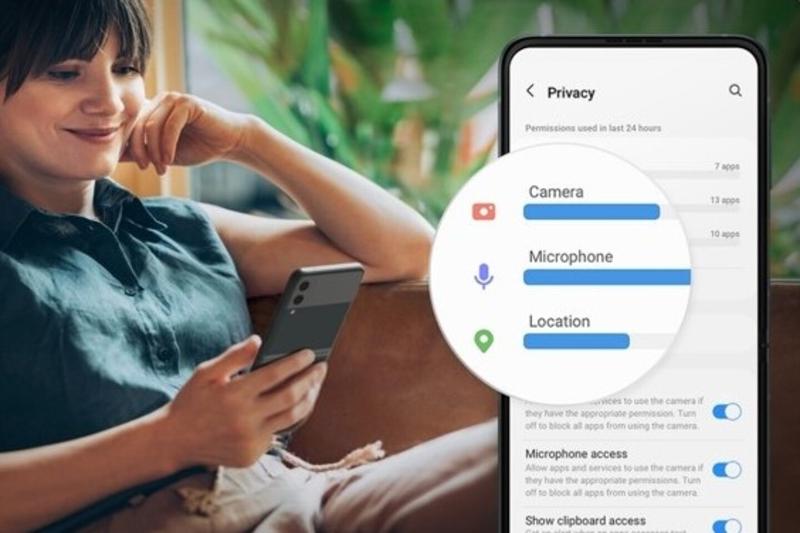
In our increasingly connected world, data powers almost everything we do. It affects the way we search, shop and show up online, and it even influences the way our devices function. While people are becoming more aware of the need to protect their personal information, they’re also realizing it’s a valuable commodity that can be used to enhance their online experiences. Recent research found that over half (53%)[1] of global consumers believe the exchange of data is important to society running smoothly. Nearly as many (47%)1 are happy to share data with businesses in exchange for a clear benefit.
In line with this, Samsung Galaxy users can decide who sees their data and how it gets used. As part of the latest update to One UI 5, the Security and Privacy Dashboard on Galaxy devices has been upgraded to make data safety even easier to manage.
Security and personal information protection menus have been merged, giving users a view of information that may be at risk. In one convenient place, the Dashboard can show the safety status of security items, let users quickly change settings and help them manage risks more seamlessly. The items that can make the biggest impact on digital safety — including Lock Screen, Accounts, SmartThings Find, App Safety, and Updates — are now instantly accessible at the top of the dashboard, and intuitive red, yellow, or green alerts show issues at a glance and provide clear indicators if there are security issues. The upgraded hub includes instant action prompts, such as permissions, that make data decisions more transparent.
[Video embed: https://www.youtube.com/watch?v=kZKK80urUZc]
When it comes to protecting personal information, keeping tabs on app permissions is one of the simplest ways to ensure your data is not unknowingly being shared. Here are four important permissions that help users reclaim their data sharing with just few quick clicks on their Galaxy devices:
Managing Ads with Ease: Online shopping is more popular than ever, and with so many platforms and apps, ads and recommendations can quickly become overwhelming. For avid shoppers who prefer to not be inundated by targeted advertisements, they can go to the Security and Privacy Dashboard, click the Privacy tab, then go to the Ads menu and select “Delete AD ID.” This means users can avoid unwanted recommendations as they continue shopping in and using their favorite apps.
Control Microphone and Camera Permissions: Galaxy users can choose exactly how much of their data can be accessed by a specific app. Users may require different app permissions depending on the situation. Gamers, for example, often need to communicate with others while playing. However if a user discovers a gaming app can access their device’s microphone at all times, they can navigate to the Privacy menu within the Security and Privacy Dashboard to adjust their preferences — including revoking microphone access when an app isn’t in use or opting for no microphone access at all. The same options are available for camera access.
Manage Location-based Services Easily: Location is one of the biggest data points users want control over as more and more apps use location-based services. As countless apps continue to keep tabs on users’ whereabouts, the Privacy menu within the Security and Privacy Dashboard lets people see what apps have tracked their location in the past 24 hours. This gives them the ability to quickly choose a new setting, such as sharing only while using an app for things like ride shares or not at all. By toggling the settings based on individual preferences, user can disable precise location tracking, allowing only approximate tracking.
Keep Your App Preferences Up to Date: Many apps are downloaded for specific occasions and then left installed and unused for long periods of time. Often times, people don’t realize that these apps might continue tracking their data and activity months after installing them, whether or not they are in use. To prevent apps from accessing more data than necessary, Galaxy devices will proactively protect users’ privacy by removing permissions from apps that haven’t been used in a while. If users want to reinstate the permissions, the Security and Privacy Dashboard makes it easy to do so at any time.
To keep up with the evolving world as our lives become more centered around data use, Samsung will continue to prioritize users’ security and privacy. Samsung will ensure Galaxy users can manage their data according to their preferences, empowering them to easily navigate an increasingly data-driven world.
You might also like
More from News
Digital Walker Launches Cosmic Box: A Tech-Powered Mystery Unboxing Experience This February!
Tech shopping just got a whole lot more exciting. This February, Digital Walker is launching Cosmic Box, an exclusive blind …
Salmon Launches New Affiliate Program! Get Up to PHP 500 for Every Successful Referral
Salmon Launches Affiliate Program to Empower Filipino Creators and Expand Financial Access Salmon, a leading fintech company in the Philippines, has …








